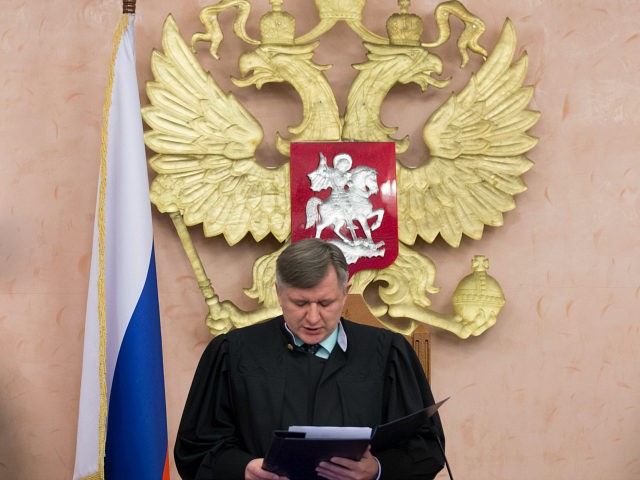Delegations from around the globe were in Washington this week for the U.S.-led, first Ministerial to Advance Religious Freedom, including two representatives from the world headquarters of Jehovah’s Witnesses in New York who used the opportunity to highlight the persecution of followers in Vladimir Putin’s Russia.
Jarrod Lopes and David Williams spoke with Breitbart News on Friday on the sidelines of the ministerial. The timing reflects the tenets of their faith, which calls for followers to inform those in power but not persuade them to take action in keeping with their belief to not participate in government and politics.
“We do more of an information campaign,” Lopes told Breitbart News. “We will tell people who are interested — who either invite us or agree to speak with us and we’ll tell them the situation.”
In the case of Jehovah’s Witnesses in Russia, the situation is grim. The religion has been virtually banned in the country for more than a year and recent raids have resulted in 26 people being placed in “pre-trial detention” while they await trial on charges of “organizing extremist activities.”
They face six to ten years behind bars if convicted, Lopes said.
In the case of this religious minority, the crime is gathering for worship because the Russian government has deemed the Witnesses’ Bible as not real, and its trademark religious newsletter and literature has also been labeled “extreme.”
Aside from arrests, Lopes and Williams said armed Russian police conduct raids on the homes of Witnesses, seizing money, cell phones, and other personal possessions.
Newsweek reported in April about some of the ongoing persecution:
In Russia, where the Orthodox Christian Church has deep ties to the highest levels of the Kremlin, the government has labeled Jehovah’s witnesses an “extremist” sect. The ruling was made exactly one year ago, in April 2017, and came into force just a few months later when Russia’s Supreme Court dismissed an appeal. The group’s administrative center in St. Petersburg, Russia, was consequently dissolved, and Jehovah’s witnesses were forced to begin worshiping in secret in their homes after almost 400 local chapters shuttered.
Meanwhile, many say they have faced systematic harassment by security forces. Since January, members of the group say they have had their homes raided on at least seven separate occasions, four of which took place in April.
“It’s a new wave of persecution,” Yaroslav Sivulsky, a Russian Jehovah’s Witness who is now living in exile in Latvia, told Newsweek. “We don’t know what’s happening.”
Of the more than eight million Witnesses around the globe, some 170,000 are living in Russia.
So what Lopes and Williams and other Jehovah’s Witnesses hope their “information campaign” will accomplish is awareness of the plight of the followers in Russia, which could result in pressure from the international community to end the persecution.
And the world is taking notice.
On Thursday, as part of the ministerial, Vice President Mike Pence spoke about it.
“In Russia, more than 170,000 Jehovah’s Witnesses face similar persecution to other countries around the world,” Pence said. “They’re legally banned from practicing their faith.”
“Government agents have seized Jehovah Witnesses’ headquarters near St. Petersburg, raided their prayer halls across the country, and arrested and imprisoned scores of believers,” Pence said.
In June, Human Rights Watch issued a report titled “Russia: Sweeping Arrests of Jehovah’s Witnesses.”
“The Jehovah Witnesses are simply peacefully exercising their right to freedom of religion,” Rachel Denber, deputy Europe, and Central Asia director for Human Rights Watch said in the June report. “The Jehovah’s Witnesses faith is not an extremist organization and authorities should stop this religious persecution.”
The United States Commission on International Religious Freedom’s (USCIRF) 2018 report condemned the persecution:
Jehovah’s Witnesses were subjected to a nationwide campaign of discrimination, mistreatment, and expro-priation. Dozens of prayer meetings were raided and participants threatened with prosecution. Witnesses were dismissed from their jobs, schoolchildren and their parents were interrogated and threatened, and the community’s buildings and property were burned and vandalized.
Jehovah’s Witnesses also were no longer permitted to request alternative service as conscientious objectors and were ordered to report for military service.
So far, Russia has not responded to international pressure and, in fact, the targeting of congregants has increased since Putin’s re-election, according to Lopes and Williams.
That is why Lopes and Williams traveled to D.C. along with hundreds of other religious freedom leaders and advocates during a week when eyes were focused on the nation’s capital and its top diplomats.
“We’re not rallying against anybody, we’re not inciting against anybody,” Lopes said, describing the religious tradition as “peaceful worship.”
Instead, their prayer is that — with the help of others who cherish religious freedom — the persecution of Jehovah’s Witnesses in Russia will come to an end.

COMMENTS
Please let us know if you're having issues with commenting.